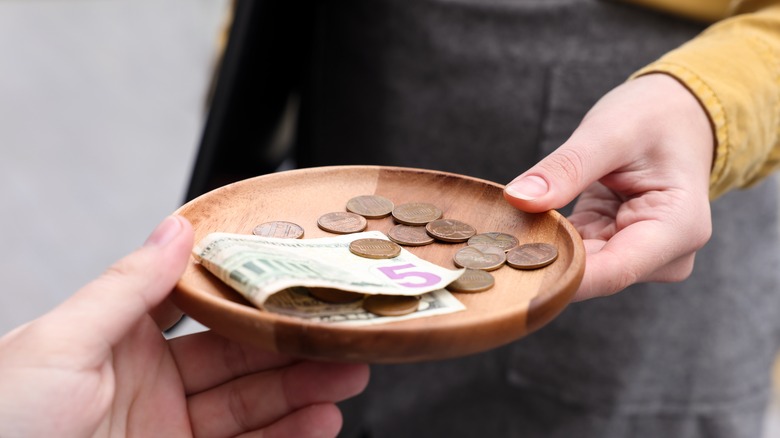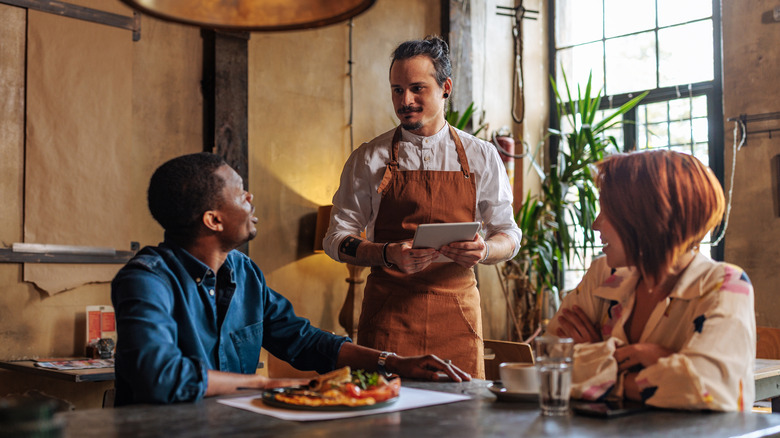The Tipping Mistake You're Probably Making When Traveling Abroad
Traveling abroad is exciting, but it can also be nerve-wracking. That's because not only do you have to navigate the logistics of international travel, but you also might find out that there are some cultural practices from the United States that just don't translate to other countries. Take tipping, for example. When dining out in the United States, there's one thing you always need to keep in mind: You'll need to add a tip of about 20% to your final bill at most sit-down restaurants. But it turns out that in some locations across the globe, not only is a 20% tip unnecessary, it can be insulting.
Though tipping practices vary across the world, America is pretty much the only country other than Canada where tipping 20% of the bill is considered the norm (and in Canada, it's more like 15–20%). That means that unless you're in the United States if you're tipping 20%, you're actually over-tipping. It might not seem like that big of a deal, but consider this: In some countries, like Japan, leaving a tip is considered rude. It's also a waste of your money, since in most other countries, servers aren't relying on tips as part of their wages. So why is it so different in the United States, and what should you tip when traveling abroad?
Why is tipping 20% so common in America?
While U.S. travelers who go abroad might worry about tipping too much, travelers to America might be shocked that 20% is commonly considered to be the average tip. Why is it so different here? The primary reason is that U.S. servers and waitstaff usually make more than half of their income through tips, according to the National Employment Law Project. Employers of tipped employees who receive $30 or more in tips per month are only required to pay their workers $2.13 an hour, if that employee's tips bring their hourly wage up to the federal minimum wage which is just $7.25 an hour, depending on location. That means that the majority of restaurant servers are making just a few bucks an hour from their employer, and the rest of their wages come from tips.
It might seem strange to have the customers footing the bill for restaurant employees' wages, but tipping has been part of U.S. culture since the 1800s, and really took hold as a business strategy after the Civil War. This ingrained system means it's common to tip 15–20% even if the meal is lousy, especially if it's for reasons beyond your server's control like long wait times for food, or the kitchen sending out the wrong order. Ultimately, diners know servers rely heavily on tips for their livelihood and don't want them to take home lower wages even if service is poor.
How much to tip when traveling abroad
Unless you're visiting Canada, U.S. travelers don't need to factor in a 20% tip into their dining budget. In the United Kingdom, 10–15% is fine, and in most countries in continental Europe, tipping 5–10% is the norm. In fact, it's common to just add a Euro or two (or the equivalent in the country's currency, for those that don't use the Euro) per person in your party as a tip, which is easy enough to remember. It might feel awkward to Americans to leave so little, but remember that most of these restaurant employees are paid hourly wages and aren't expecting tips to make up the bulk of their income.
Across Asia, it's more common to see a service charge added to your bill, which you don't need to tip on top of, and some restaurants will flat-out refuse tips. In Central and South America, a 10% tip is fine. A 5–10% tip is acceptable in many African countries, but there are some countries where 10–15% is more common.
Don't forget though that all of these recommendations are affected by regional and country culture. If you're unsure, you can always ask someone what's considered appropriate. Just keep in mind that leaving the standard American 20% or more at restaurants as a default is a mistake almost everywhere when traveling abroad. Save your money (and your dignity) by following regional tipping practices when you travel, and never be afraid to ask questions — it might even open the door to making some new international friends.


